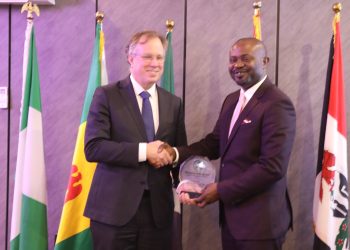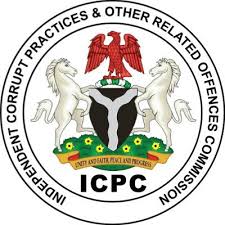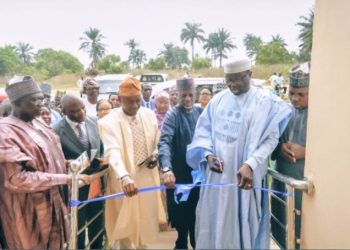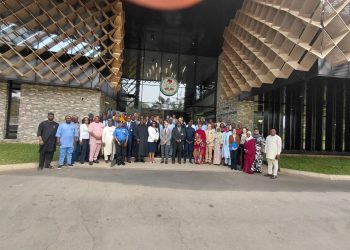By Nkechi Eze
For numerous years now, worldwide attention has been shifted towards presiding over the effect of climate change on the environment which has been exhibited progressively across various nations of the world, with African continents bearing most of the burden.
The main focus of agenda 13 of the United Nations Sustainable Development Goals for 2023 is to take urgent action to combat climate change and its impacts globally.

For numerous years now, worldwide attention has been shifted towards presiding over the effect of climate change on the environment which has been exhibited progressively across various nations of the world, with African continents bearing most of the burden.
The main focus of agenda 13 of the United Nations Sustainable Development Goals for 2023 is to take urgent action to combat climate change and its impacts globally.
The effects can be seen from dramatic seasonal variation, drought, flooding, desert encroachment, global warming, wildfires, receding and drying of rivers and other environmental disasters.
Several nations across the world have been rolling out and implementing measures on how to stamp out these effects in order to protect their ecological environments.
Recall that Nigeria is part of the 193 countries that have ratified the United Nations Convention to Combat Desertification.

During the 2021 COP 26 meeting in Glasgow, Scotland, UK, 103 countries up to the Global Methane Pledged to collectively reduce methane emissions 30% below 2020 levels by 2030. Methane is a powerful greenhouse gas, with a global warming potential 6 times that of carbon dioxide over a 20-year period.
At this meeting, Nigeria pledged to end deforestation by 2030 and equally attain a zero-net emission in another 30 years later, which is 2060.
In order to keep in line with its vision of combating climate change, Nigeria deemed it imperative to create a parastatal saddled with ensuring this important environmental task.
Nigeria, a signatory to the Pan African Great Green Wall (PAGGW)- African Unions Great Green Wall initiative, took the bold step to sign the Act for the new Agency in 2015. There are eleven member countries. Some countries are struggling to be part of the scheme, because of its successes.
The National Agency for the Great Green wall (NAGGW) which was established by Act of Parliament in 2015, with its main aim to pursue the laudable vision of the African Union, its Heads of State and Governments when they adopted and launched the Great Green Wall in the Sahel and Sahara Initiative (GGWSSI), which initially began in 2007.
The GGWSSI involves a range of stakeholders including National Governments, International Organizations, the private sector and Civil Society who all work together under the coordination of PAGGW to combat land degradation and improve the livelihoods of the affected communities.
Over the years, scores of international partners which includes the United Nations Convention to Combat Desertification (UNCCD), Food and Agricultural Organization (FAO), World Bank, Global Environment Facility (GEF), International Union for Conservation of Nature (IUCN) among others, have mobilized significant investments to thrust ahead the implementation of GGW initiative.
The GGW initiative successfully began its operations in Nigeria in 2013. It was established to combat land degradation, drought and desertification and other hazards, brought about by impacts of climate change, and a strive in the implementation process to improve on the livelihoods of the affected communities and reduce apparent manifestation of poverty, and building the resilience of the people on the phenomena of climate change.
The GGWSSI which spanned from Djibouti to Senegal, involves eleven (11) countries (Djibouti, Eritrea, Ethiopia, Sudan, Chad, Niger, Nigeria, Mali, Burkina Faso, Senegal and Mauritania).
No doubt, the implementation of the GGW initiative has helped enormously in putting a stop and reversing degradation of the ecosystem in the affected countries, while at the same time ameliorating the living conditions of the affected communities.
The GGWSSI has a major goal, which is to restore 100 million hectares of currently degraded land; sequester 250million tons of carbon and create 10million green jobs by 2023. It is anticipated that this initiative will transform the dry lands of Africa from threat to livelihoods to provider of livelihoods.
It will transform the livelihood of millions of people living in poverty and suffering the effects of the climate crisis. It will also help to break the circle of migration and conflict, prevalent in the Sahel areas of Africa, among other positive effects and impacts.
Member states including Nigeria at the National level, have established National Great Green Wall Agencies or focal points to supervise and coordinate the implementation of National Great Green Wall priority actions. The Great Green Wall for Sahel Initiative (GGWSSI) is more than creating a wall of trees stretching from Senegal in West Africa to Djibouti in East Africa. It is a metaphor to depict a mosaic of integrated interventions, tackling the multiple challenges affecting the lives of people in the Sahel and Sahara areas. It is an African Union Programme bringing together 20 countries.
The implementation of the initiative in Nigeria encompasses the eleven frontline states of Adamawa, Bauchi, Borno, Gombe, Jigawa, Kano, Katsina, Kebbi, Sokoto, Yobe and Zamfara.
Desertification remains one of the major environmental challenges in Nigeria threating the livelihoods of over 50 million in these states. It involves the establishment of greenbelt covering 1,500km from Dandi Arewa Local Government Area of Kebbi State to Marte in Borno State.

The Great Green Wall initiative holds the key to the future of African drylands. It is a daring initiative that has the potential to bring back to the continent food and water security, create jobs and new economic opportunities, help in fighting climate change and allow people not only survive, but to thrive sustainably.
Specifically in Nigeria, the initiative remains the major technique that can be used to ensure the sustainable development of the drylands, combat rural poverty and create hope for the affected people.
Specifically, the NAGGW has the strategic work plan to address afforestation and land management, renewable energy delivery, rural infrastructure assisted project/ activities, job creation/employment generation, capacity building and development, monitoring and evaluation.
As parts of its efforts to realize its mandate, and with the release of capital in 2017, the agency embarked on afforestation for the planting of trees, which received attention and also funding from the Natural Resources Development Fund and the Ecological Fund Office.
Since the launch of the program, about thirty seven million two hundred and fifty two thousand one hundred and seventy nine trees are been planted.

The project which was divided into phases, planted seven million trees in the first phase in Borno, Jigawa, Katsina and Yobe states and later extended to over forty four million, two hundred and fifty one seedlings.

The tree planting project is not just about raising and planting the seedlings, but has additional components of protective parameters around such trees, with provision of solar powered boreholes.
Without utmost protection, the seedlings would have been eaten up by domestic and wild animals, thereby defeating the goal of the project.
The second, third and fourth phase includes Kano, Zamfara and Kebbi Satates.
As at 2023, the project has seen the planting of 21million trees across the eleven frontline states of Nigeria in the North.
Under the Agency’s rural infrastructure and development plan, four types of boreholes were provided. The boreholes are solar powered; some are motorized, including the ones at the various plantation sites with gate houses and solar power as well as solar lights.
This project oversees the provision of not less than four hundred and twenty seven solar and motorized powered boreholes in the catchment areas.
The state counterpart participation includes the provision of security for these sites. The boreholes were provided at intervals to cover the needed plantation areas.
In a bid to boost the economic activities of the affected areas, create jobs and wealth in rural communities in these states, solar powered boreholes were also provided for various orchards where fruit bearing trees are been grown.
The herders too were not forgotten as they also need water to tend to their cattle. With regards to this, the Agency under the borehole provision plan, provided various solar powered boreholes at various locations, to assist with animal grazing.
For provision of easy water, the agency did not just provide solar and wind powered boreholes, there was also construction of mini dams where rainwater can be harvested and used for human and animal consumption as well as dry season farming, which is one of the employment generation schemes in the frontline states. Vegetables such as cabbage, pepper, carrots and cucumber are provided by these farmers, among others.
Through the reclaiming scheme of the degrading lands, afforestation has successfully reclaimed degraded landscape of over 13.3 hectares in the frontline states through tree planting, and over ten million three hundred, through the distribution of seedlings to farmers and villagers.
In a bid to provide alternate means of livelihood to affected communities, the agency also created about three thousand seven hundred and ninety jobs for women, men and youths while a host of others are still being engaged in skill acquisition programmes at various vocational training centres.
These skills includes tailoring, soap making and perfumes, as well as knitting. Each of the students after graduation, were given starter packs in form of an initial capital to begin a trade. The starter packs includes sewing machines for tailors, knitting machines for those who learnt how to knit, as well as various chemicals and fragrances for those who learnt to make soaps and perfumes.
Rural clean energy scheme is one of the most resounding activities of the agency, where 4,455 (four thousand, four hundred and fifty five) solar lighting systems were acquired and doled out to homes and markets. This is in addition to more than five hundred and six solar street lights that were installed across various communities.
Resolved to mitigate climate change effects through encouraging the use of alternative energy source, over 6,300 (Six thousand, three hundred) wooden stoves were procured and distributed to the villagers in order to discourage the cutting down of trees.
Also about 6,289 hectares of plantations were established while 1,460km shelter belts were realized, in order to counter desertification,
Other ground breaking achievements recorded by the (NAGGW) using the Green Bond proceeds and other funding mechanisms since its inception include the production 105.2ha community woodlot, 58.5ha community orchard, construction of E-Library and GIS laboratory, installation of automatic weather stations at APCU Kano and NEAZAP, Gashua; construction of nine solar-powered boreholes for water supply and rehabilitation, through the FAO supported AAD programme, and a pilot community-based fish farming project in Yobe State.
In April 2023, the Director General of the NAGGW, Dr. Yusuf Maina-Bukar marked his one year in office. As the head of the agency, he rolled out score sheet of his gains and strides recorded within the period.
Former president Muhammadu Buhari had in April 2023 appointed Dr. Yusuf Maina Bukar as the Director General of the NAGGW. It is worthy to note how easy it was for the DG to fit into the Agency, because he has been a part of the Green family.
Until his appointment, Dr. Maina-Bukar was a lecturer at the department of geography in Yobe State University and has vast expertise in climate change adaptation.
Maina-Bukar holds a doctorate from the University of Liverpool in the United Kingdom, Master of Science degree from the University of Dundee in the Uk and a bachelor’s degree in urban and reginal planning from the Ahmadu Bello University in Zaria, Kaduna state.
Since his assumption of office, his focus in the agency has been on implementation of afforestation and reforestation activities, land restoration and sustainable land management policies.
Dr Bukar’s achievements has demonstrated positive impact on the environment and the livelihood of communities and affected areas.
While revealing his accomplishments during his one year in office, he noted that some of the agency’s key achievements within the period in view includes; the establishment of shelterbelts, woodlots, orchards and most recently, institutional planting, social farm fore steads, marketable gardens and large-scale restoration of graded land to ameliorate the challenges of the environment in the affected communities.
Dr. Bukar also revealed there has been introduction of strategies and approaches to improve the efficiency and effectiveness of the Great Green wall afforestation and reforestation programmes such as the half-moon and Zai methods of planting that enhance seedling and tree survival rate, improve soil retention capacity, improve soil fertility and increase vegetation cover.
The Great Green Wall programme has been able to provide numerous job opportunities for young people and women in rural communities, by training on the sustainable land management techniques, supporting them to establish tree nurseries, forest plantations and other skills to improve their economic conditions.
Introduction of various reforms and initiatives such as establishing security services unit to further reposition the agency for effective service delivery became imperative, to coordinate security support services, and reduce operational risks faced by staff of the agency in security prone areas of the service improvement unit (RCSIC), to improve service delivery and work ethics.
The agency has so far trained more than 1,367 rural community people, which are women and youths in various livelihood activities. This is in addition to 275 farmers that were also trained on climate smart agriculture techniques and skills required during dry season farming.
On capacity building, the agency has also continued to support various local and international training of personnel to improve productivity within its fold. In this vein, the agency obtained presidential approval to clear Nigeria’s outstanding contributions to the convention of the Pan African Agency of the Great Green Wall from 2018 to date, to the tune of $654,291.00.
A pledged sum of $550,000.00 was also approved as Nigeria’s voluntary contribution towards the construction of the Pan African Agency for the great green wall headquarters in Nouakchott, Mauritania and purchase of three vehicles for of the agency’s secretariat in Nouakchott, Mauritania.
Over the years, the agency has employed different strategies to reach out to operational communities.
In April 2023, the NAGGW signed a Memorandum of Understanding (MOU) in the Netherlands with GROASIS B.V and Boplas Industries Limited Nigeria for production of waterboxx in Nigeria.
The Groasis waterboxx is an innovation adopted to improve the efficiency and effectiveness of Great Green Wall planting activities in the 11 frontline field operational areas of the Agency.
The waterboxx is an Ecological water saving technology that has proved its effectiveness in enhancing tree survival, increasing growth speed, and reducing the amount of water being used to plant millions of trees in 55 countries around the world.
It did not come as a surprise when the NAGGW expressed its interest by keying into this advanced technology or irrigation method which is very crucial for the implementation of its programmes.
In terms of youth engagement, the agency has already registered 15,000 youth volunteers that will participate in afforestation and reforestation, alternative sources of energy, jobs and income generation, capacity building in order to mitigate the effects of climate change.
The volunteers will be engaged in the implementation programes in 11 frontline states of Borno, Yobe, Jigawa, Kano, Katsina, Sokoto, Zamfara, Kebbi, Bauchi, Gombe and Adamawa such as land restoration and management practices and to demonstrate a positive impact on environment.
Projects under the National Agency for the Great Green Wall are always monitored and evaluated to the latter. This is not done by the agency alone but with civil society groups and the media inclusive. They travel around for weeks, to monitor specific projects.

The Nigeria Great Green Wall project is one of the best among all African countries that started similar projects.
This is evident when looking at the strides recorded in developmental projects and boosting of human capacity by the present and past administration of the agency since its inception.
It is evident that Nigeria is surely on course with the NAGGW leading the crusade, to realize a safer environment by mitigating the effects of climate change as a crucial subject of discourse among the global nations at the moment.















